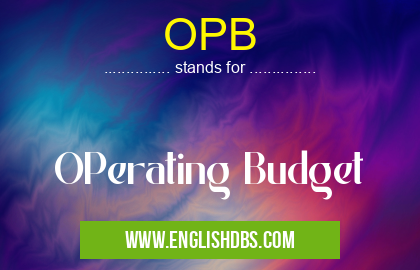What does OPB mean in GENERAL
Operating Budget (OPB) is a financial plan that tracks the budget of an organization's operations over a specific period of time. It is a key document in financial management and accounting, as it provides information about how much money is allocated to different areas within the company. OPB helps organizations allocate their resources efficiently and monitor their progress towards achieving business goals.

OPB meaning in General in Business
OPB mostly used in an acronym General in Category Business that means OPerating Budget
Shorthand: OPB,
Full Form: OPerating Budget
For more information of "OPerating Budget", see the section below.
Meaning
Operating budget or OPB is a crucial part of financial planning for businesses. It helps them effectively manage their resources to ensure they meet their operational costs and profit targets, while also highlighting areas of potential improvement or growth. An OPB outlines expenses, income, and investments related to operating activities – such as sales, research & development, marketing, payroll etc. It gives an overview of how funds are allocated so that managers can assess performance against targets and adjust spending if necessary.
Benefits
Having an effective OPB in place can provide numerous benefits for any business. By keeping track of the flows of cash, it allows better resource allocation decisions to be made with greater confidence since all past data can be referenced easily. An OPB also helps create financial forecasts which enable companies to plan ahead for future investments and estimate potential revenue streams accurately. Moreover, it gives managers a clear understanding of the operations’ budget and allows them to compare it against historical performances or industry standards for benchmarking purposes.
Essential Questions and Answers on OPerating Budget in "BUSINESS»GENERALBUS"
What is an OPB?
An OPB, or Operating Budget, is a plan for the total spending and revenues of an organization over a specific period of time. It typically includes budgeted amounts for both salaries and other operating expenses in order to meet the goals of the organization.
How does an OPB help organizations?
Operating Budgets provide organizations with guidance on how to prioritize their spending and help them stay within their desired spending limits. It also helps organizations identify areas where they can save money and improve efficiency.
What should be included in an OPB?
An OPB should include projected earnings, expenses, assets, liabilities, and cash flows. Additionally, it should include budgets for personnel costs such as wages and benefits as well as capital investments like equipment purchases or renovations.
Who usually creates the OPB?
The responsibility for creating an Operating Budget typically falls to the financial leadership of the organization such as accounting personnel or chief financial officers (CFOs). They use historical performance data and budgetary constraints to create the plan.
How often should an organization review its OPB?
Most organizations review their OPBs on a regular basis to ensure that they remain on track with their spending goals. This could be done monthly, quarterly or annually depending on the size and complexity of the organization’s operations.
What factors need to be taken into consideration when developing an OPB?
When creating an Operating Budget there are many factors that must be taken into consideration including anticipated revenues, planned expenses, cash flow projections, timing considerations etc. Additionally any changes in economic conditions or market trends must also be considered.
Are there any tools available to help create a detailed OPB?
Yes there are many software tools available that can help organizations create more detailed operating budgets with ease such as budgeting spreadsheets or cloud-based solutions like QuickBooks Online or CashFlow Toolkit.
Is it possible to design multiple versions of an Operating Budget plan at once?
Yes most modern software platforms allow users to create multiple versions of their operating budget plans simultaneously so they can compare different scenarios side by side before making final decisions.
Are there any tips for ensuring accurate forecasting when creating an OPB?
Yes it is important for organizations to thoroughly research their markets before creating their budgets in order to ensure accuracy in their forecasting models and avoid any costly surprises down the line due to inaccurate information being used in projections.
Does every business need have an up-to-date Operating Budget plan?
Yes all businesses should strive for having up-to-date operating budget plans since it is essential for staying ahead of changing economic conditions as well as staying within spending limits established by management.
Final Words:
Operating Budget (OPB) is an essential tool in helping businesses manage day-to-day operations more effectively by keeping track of expenses and revenues related to various aspects such as sales, marketing etc.. It also allows companies to make well-informed decisions about resource allocation based on past data trends as well as enabling them to forecast future outcomes more accurately by comparing finances against industry standards or historical performances. In short, having an effective OPB goes hand in hand with managing all aspects of business operations successfully.
